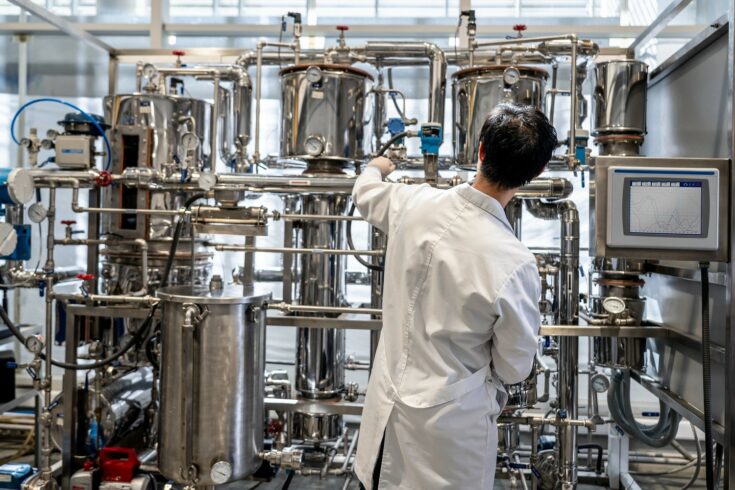Nine exciting projects using cutting edge biotechnology to produce high-value chemicals have received a total of £2.2m in funding, plus a further £555k support from industrial partners.
Projects include:
- one that seeks to produce improved enzymes from waste, which could be used in cleaning products
- one that seeks to produce rose fragrance for perfumes in a more efficient way
- two that seek a biotech route to producing anti-cancer drugs
- one that seeks to develop an enzyme that repels crop-eating pests
- one that looks for new ways to produce bioplastics.
The funding has been awarded by the Biotechnology and Biological Sciences Research Council (BBSRC) under its Industrial Biotechnology for Improving Production of Higher Value Chemicals programme. £2.2m was available for grants to support short collaborative projects of between 12 to 24 months with a value up to £250k.
Meeting consumer demand for more sustainable products
The projects – based around the UK – all seek to use ingenious scientific methods to bring chemical products to market, many with sustainable manufacturing practices. This could result in lower carbon emissions and meet consumer demand for more sustainable products, which move away from using fossil-based carbon.
Academic institutions have teamed with commercial partners in this programme, to propose new ways of producing products for the vital UK chemical industry. This sector of the economy generates £9bn gross value added (GVA) per year, employs 105,000 people, and is one of the highest energy intensive industrial sectors.
BBSRC’s Executive Chair, Professor Melanie Welham said:
The chemical industry faces challenges to become more sustainable and lower its carbon emissions whilst also providing better quality and more affordable chemicals and pharmaceuticals.
The scale of this challenge is matched by the ingenuity and innovation of our biotech sector. Leading academics in this field have partnered with industry to propose fascinating potential solutions. By backing the best of British research and innovation BBSRC demonstrates how science is crucial to society and the economy.
Further information
Grant holders
| University of Edinburgh | Sustainable cold expression of cleaning enzymes | £249,924.14 | Diageo plc
Unilever Ingenza Ltd |
| Cardiff University | A dynamic and flexible manufacturing platform: intensifying biocatalysis for fragrance and API production | £249,417.91 | BioExtractions Wales Ltd |
| University of Oxford | Chemoenzymatic routes to rose oxide | £249,977.04
|
Oxford Biotrans Ltd |
| University of Manchester | Production of Niraparib using Imine Reductases | £245,051.56
|
GSK
Prozomix Ltd |
| Rothamsted Research | Improving production of high value terpene synthases for next generation pest management | £249,472.40
|
Biocleave Ltd |
| University of Liverpool | Development of oxidases for synthesis of bioplastics intermediates | £249,034.44
|
Biome Bioplastics Ltd |
| University of Liverpool | Development of a biotechnology platform for enzymatic sulfation of industrial products based on polysaccharide sulfotransferases | £249,727.84
|
Unilever |
| University of Edinburgh | Development of an improved biomanufacturing platform for a key pharmaceutical | £227,091.51
|
Green Bioactives |
| University of Nottingham | Bioproduction of a high-value synthetic ketone ester and its precursors for a UK-based value and supply chain | £249,845.52
|
CHAIN Biotechnology Ltd |
About Industrial Biotechnology for Improving Production of Higher Value Chemicals
There is a strong industry driver to reduce carbon emissions, and consumer demand for more sustainable products, which move away from using fossil-based carbon to manufacture chemicals. These increased drivers for sustainability mean that the industry is open to innovation that will lead to more sustainable manufacturing practices and could enable the UK chemicals industry to return to a world leading position.
Modern bioscience technologies and multidisciplinary approaches have the potential to enable the industry to address this challenge, through the production of chemicals via bioprocesses, and the manufacturing of bio-based chemicals from non-fossil fuel-based feedstocks. This approach can reduce emissions and address sustainability issues by reducing demands on fossil fuels, lowering the energy costs of traditional chemical process, and permitting the development of novel materials with improved properties.
Applying biological processes to the manufacturing of higher value chemicals can be beneficial in three ways:
- Producing higher quality products with low levels of impurities
- Lowering manufacturing costs through reduction of process steps; energy requirements and purification costs lead to more sustainable products and manufacturing methods
- In addition to reducing energy consumption it can use waste biomass rather than fossil-based feedstocks.
UK government strategies
UK government strategies also support these changes, for example through the UK Clean Growth strategy. The strategy highlights the impact of the chemicals industry and includes priorities for low carbon innovation, clean energy innovation, energy efficiency, carbon capture usage and storage and zero waste by 2050.
The UK Bioeconomy strategy recognises the potential of bioscience. It has the vision that, in 2030, the UK will be a global leader in developing, manufacturing, using and exporting bio-based solutions.
In addition, the Chemistry Council’s strategy states that biotechnology has an increasing role to play in the chemicals industry:
- delivering advanced materials and molecules
- creating a pipeline of green supply chains including waste to feedstocks
- supporting clean growth by rebuilding cost competitive and carbon efficient supply chains.

